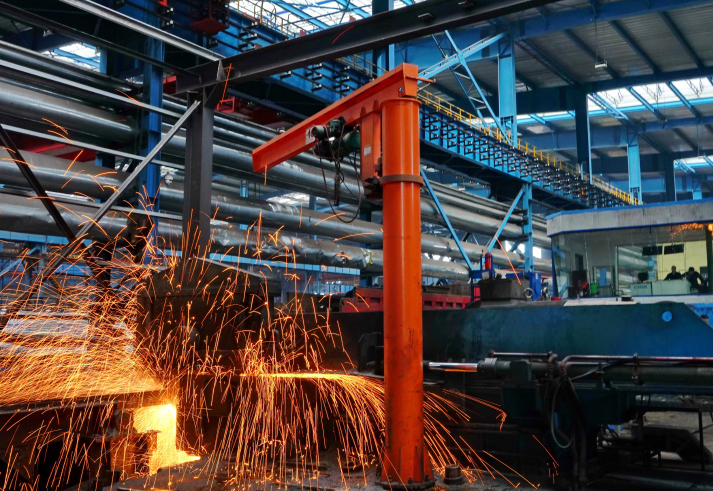The strong performance of Chinese listed companies in the first half of the year offered a glimpse into the positive changes and strength of the country's economy.
Listed companies on the A-share market were required to file their second-quarter reports with the Shanghai and Shenzhen stock exchanges before the end of August.

A workshop for steel products in Qian'an, north China's Hebei Province. The city has been making big strides in cutting excessive steel production capacity and upgrading the industry (XINHUA)
The combined revenue of all listed companies on the market stood at 20.81 trillion yuan ($3 trillion) in the first half, while net profits were close to 2 trillion yuan ($292.6 billion), both rising by more than 10 percent year on year, new data from the bourses showed.
Firms listed in Shanghai saw revenue and profit growth rates of 11 percent and 14 percent respectively, while companies listed in Shenzhen grew at 17.24 percent and 16.86 percent.
As the country moved to enhance support for the real economy, Shanghai-listed companies in the real economy reported revenue growth of 13 percent and profit growth of 25 percent, much faster than the 7-percent revenue and profit growth of financial companies in the city.
Firms in the real economy contributed 41 percent to the net profit of companies on the Shanghai bourse, up 4 percentage points from the previous year.
The China Banking and Insurance Regulatory Commission (CBIRC) said in August that it had encouraged banks and insurance companies to increase funding to meet the financing demands of the real economy.
The commission urged banking and insurance institutions to make full use of the current favorable conditions of abundant liquidity and declining financing costs to raise their financing support for the real economy.
In the first half of the year, Shanghai-listed companies in the real economy reported total financing of around 4.5 trillion yuan ($658.9 billion), up 9 percent year on year, with the majority coming from the banking system.
The central bank will raise the capacity and willingness of financial institutions to serve the real economy to create a moderate financial environment for supply-side structural reform and high-quality development, according to the central bank's second-quarter report.
Thanks to the supply-side structural reform, the crude oil, steel and non-ferrous metal sectors all experienced breathtaking growth in revenue and profit.
The net profit of steel companies listed in Shanghai surged 134 percent year on year in the first half of the year, partly due to the country's firm stance on eliminating excess production capacity.
In the first seven months of 2018, China cut outdated crude steel capacity by 24.7 million tons, completing more than 80 percent of this year's capacity-cut target of 30 million tons, according to the latest data from the National Development and Reform Commission.
The net profit of the crude oil and non-ferrous metal sectors on the Shanghai bourse both surged by 75 percent year on year, the Shanghai Stock Exchange said.
On the Shenzhen bourse, 957 companies in new energy, high-end equipment manufacturing and new materials sectors grew more than 20 percent in both revenue and profits.
China's economy expanded 6.8 percent year on year in the first half of the year, above the annual target of 6.5 percent.
This is an edited excerpt of an article originally published by Xinhua News Agency